-
January
-
February
- This Week in History: February 6-12 – Lesson
- This Week in History: February 6-12 – Quiz
- This Week in History: February 13-19 – Lesson
- This Week in History: February 13-19 – Quiz
- This Week in History: February 20-26 – Lesson
- This Week in History: February 20-26 – Quiz
- This Week in History: February 27-March 5 – Lesson
- This Week in History: February 27-March 5 – Quiz
-
March
- This Week in History: March 6-12 – Lesson
- This Week in History: March 6-12 – Quiz
- This Week in History: March 13-19 – Lesson
- This Week in History: March 13-19 – Quiz
- This Week in History: March 20-26 – Lesson
- This Week in History: March 20-26 – Quiz
- This Week in History: March 27-April 2 – Lesson
- This Week in History: March 27-April 2 – Quiz
-
April
- This Week in History April 3-9 – Lesson
- This Week in History April 3-9 – Quiz
- This Week in History: April 10-16 – Lesson
- This Week in History: April 10-16 – Quiz
- This Week in History: April 17-23 – Lesson
- This Week in History: April 17-23 – Quiz
- This Week in History: April 24-30 – Lesson
- This Week in History: April 24-30 – Quiz
-
May
- This Week in History: May 1 – 7 – Lesson
- This Week in History: May 1 – 7 – Quiz
- This Week in History: May 8 – 14 – Lesson
- This Week in History: May 8 – 14 – Quiz
- This Week in History: May 15 – 21 – Lesson
- This Week in History: May 15 – 21 – Quiz
- This Week in History: May 22-28 – Lesson
- This Week in History: May 22-28 – Quiz
- This Week in History: May 29-June 4 – Lesson
- This Week in History: May 29-June 4 – Quiz
-
June
- This Week in History: June 5 – 11 – Lesson
- This Week in History: June 5 – 11 – Quiz
- This Week in History: June 12-18 – Lesson
- This Week in History: June 12-18 – Quiz
- This Week in History: June 19-25 – Lesson
- This Week in History: June 19-25 – Quiz
- This Week in History: June 26 – July 2 – Lesson
- This Week in History: June 26 – July 2 – Quiz
-
July
- This Week in History: July 3 – 9 – Lesson
- This Week in History: July 3 – 9 – Quiz
- This Week in History: July 10 – 16 – Lesson
- This Week in History: July 10 – 16 – Quiz
- This Week in History July 17 – 23 – Lesson
- This Week in History July 17 – 23 – Quiz
- This Week in History – July 24-30 – Lesson
- This Week in History – July 24-30 – Quiz
- This Week in History: July 31 – August 6 – Lesson
- This Week in History: July 31 – August 6 – Quiz
-
August
- This Week in History: August 7-13 – Lesson
- This Week in History: August 7-13 – Quiz
- This Week in History: August 14 – 20 – Lesson
- This Week in History: August 14 – 20 – Quiz
- This Week in History: August 21 – 27 – Lesson
- This Week in History: August 21 – 27 – Quiz
- This Week in History: August 28 – September 3 – Lesson
- This Week in History: August 28 – September 3 – Quiz
-
September
- This Week in History: September 4 – 10 – Lesson
- This Week in History: September 4 – 10 – Quiz
- This Week in History: September 11 -17 – Lesson
- This Week in History: September 11 -17 – Quiz
- This Week in History: September 18 – 24 – Lesson
- This Week in History: September 18 – 24 – Quiz
- This Week in History: September 25 – October 1 – Lesson
- This Week in History: September 25 – October 1 – Quiz
-
October
- This Week in History: October 2-8 – Lesson
- This Week in History: October 2-8 – Quiz
- This Week in History: October 9 –15 – Lesson
- This Week in History: October 9 –15 – Quiz
- This Week in History: October 16–22 – Lesson
- This Week in History: October 16–22 – Quiz
- This Week in History: October 23–29 – Lesson
- This Week in History: October 23 –29 – Quiz
- This Week in History: October 30 – November 5 – Lesson
- This Week in History: October 30 – November 5 – Quiz
-
November
- This Week in History: November 6 – 12 – Lesson
- This Week in History: November 6 – 12 – Quiz
- This Week in History: November 13 – 19 – Lesson
- This Week in History: November 13 – 19 – Quiz
- This Week in History: November 20 – 26 – Lesson
- This Week in History: November 20 – 26 – Quiz
- This Week in History: November 27- December 3 – Lesson
- This Week in History: November 27- December 3 – Quiz
-
December
This Week in History April 3-9 – Lesson
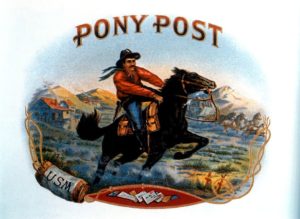
(Photo by: Universal History Archive/Universal Images Group via Getty Images)
The Pony Express and the Civil Rights Bill of 1866.
“Human history in essence is the history of ideas.” ~ H.G. Wells
April 3, 1860: The Pony Express Began
Today, we have the post office, Amazon, UPS, and a dozen other ways to have our mail delivered to our homes, and that doesn’t even count texting or e-mail. But, back in the 1800s, it took a very long time to get a letter or other parcel to someone far away. One company had an idea to speed up delivery on the American frontier: send express mail out with horse-mounted riders.
Under the official name of the Central Overland California and Pikes Peak Express Company, the Pony Express sent out its first delivery from St. Joseph, Missouri, on April 3, 1860. It was twice as fast as other methods, but it cost a lot more, too. Other mail would have to be sent by stagecoach, which could take a month or longer depending on the destination. Mail was also taken by ship, which could be several months.
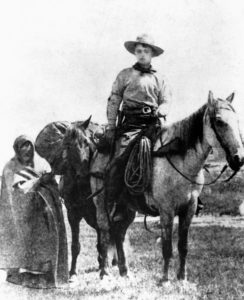
Pony Express rider, Frank E. Webner sitting on his horse around the year 1861. (Photo by © CORBIS/Corbis via Getty Images)
Alexander Majors, William H. Russell, and William B. Waddell started the company and set up about 200 relief stations in California, Colorado, Kansas, Missouri, Nebraska, Nevada, Utah, and Wyoming. One lone horseman rode between stations as fast as he could, switching horses about every ten to 15 miles. He would then hand off the cargo to another courier after 75 to 100 miles. This relay system made deliveries much faster than ever before. The fastest record happened in March 1861, when the riders went from Nebraska to California in only seven days, 17 hours to deliver the inaugural address of President Abraham Lincoln.
At first, it cost $5 for every half-ounce of mail, which would be about $130 today. Later, it was reduced to just $1, but that was still a lot of money for the time, so the service was used mostly to deliver newspapers and government information.
Although famous, the Pony Express didn’t stay in business that long, ending in October 1861 after the telegraph became popular.
April 9, 1866: Civil Rights Bill of 1866
One year after the Civil War ended, Congress passed the Civil Rights Bill of 1866.
Senator Lyman Trumbull of Illinois first introduced the bill, which said “all persons born in the United States” were “hereby declared to be citizens of the United States.” It stated that “such citizens, of every race and color, without regard to any previous condition of slavery or involuntary servitude” had the same rights, unless they were convicted of a crime.
The bill didn’t include Native Americans, but it was meant to protect the rights of black Americans after the end of slavery. The 13th Amendment, which abolished slavery, had been ratified in 1865, so this seemed the next logical step for the lawmakers. This was the first time Congress passed this type of bill for civil rights, and it went into effect April 9, 1866.
Ohio Representative William Lawrence noted why citizenship is so important to a person’s rights:
“There are certain absolute rights which pertain to every citizen, which are inherent, and of which a State cannot constitutionally deprive him … Every citizen, therefore, has the absolute right to live, the right of personal security, personal liberty, and the right to acquire and enjoy property. These are rights of citizenship …”

New York Representative Henry Raymond said the legislation was “one of the most important bills ever presented to this House for its action.” But President Andrew Johnson didn’t agree, suggesting the federal government shouldn’t have the power to make such a sweeping law, and that states should be able to make their own decisions. He vetoed the law, but the House of Representatives overrode the veto.
Johnson was the first president to ever be impeached when the House decided to bring charges in 1868 against him, over his support of slavery and the Southern states after the Civil War.
Other Notable Mentions
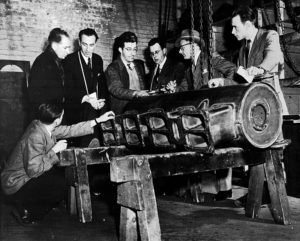
French engineers on a tour of US industrial centres, as part of the Marshall Plan. (Photo by Universal History Archive/Getty Images)
April 2, 1865: General Robert E. Lee’s troops withdrew from Richmond, Virginia and the city surrendered to Union forces during the Civil War.
April 3, 1944: The US Supreme Court ruled eight-to-one in Smith v. Allwright that black Americans could not be prevented from voting in the Texas Democratic primary elections. The court said that would violate the 15th Amendment.
April 3, 1948: President Harry S. Truman signed the European Recovery Program, also known as the Marshall Plan. It involved sending money to Europe, to spread an American influence and restore the European economy that had been devastated by World War II.
April 4, 1887: Susanna M. Salter was elected mayor of Argonia, Kansas, becoming the first woman in the US to become mayor.
April 4, 1949: The North Atlantic Treaty Organization (NATO) was created after 12 nations signed a treaty. The aim was to prevent another war in Europe, after World War II.
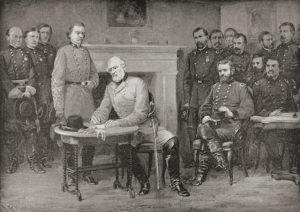
The Surrender Of General Lee To General Grant At Appomattox Courthouse, 1865. From Famous Men And Great Events Of The 19Th Century. (Photo by: Universal History Archive/Universal Images Group via Getty Images)
April 4, 1968: Dr. Martin Luther King was assassinated by a sniper in Memphis, Tennessee. A Civil Rights activist, he is most known for his I Have a Dream speech.
April 6, 1896: The first modern Olympic games were held in Athens, Greece. It had been 1,500 years since the last games.
April 6, 1917: America entered World War I in Europe after a vote by Congress approved the declaration of war.
April 8, 1952: President Harry S. Truman took control of American steel mills to prevent a strike that would shut them down. On April 29, the move was ruled unconstitutional, and workers began a strike that lasted 53 days. It ended when they received a 16-cent per-hour wage increase as well as other benefits.
April 9, 1865: The Civil War ended when General Robert E. Lee surrendered to General Ulysses S. Grant at the Appomattox Court House.
Famous Birthdays
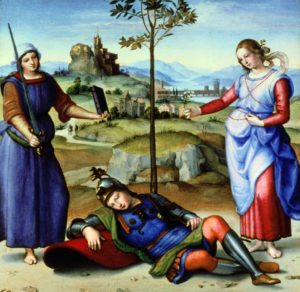
The Vision of a Knight, by Raffaello Sanzio da Urbino (Photo by: Universal History Archive/Universal Images Group via Getty Images)
Washington Irving (April 3, 1783) was born in New York City. An author, he is well-known for his works which include The Legend of Sleepy Hollow and Rip Van Winkle.
Dorothea Dix (April 4, 1802) was born in Hampden, Maine. When only in her teens, she founded a home for girls in Boston, Massachusetts. During the Civil War she was superintendent of women nurses.
Booker T. Washington (April 5, 1856) was born a slave in Virginia. He taught himself the alphabet and later graduated from an agricultural institute. In June 1881, he became the principal of a school that trained black Americans in Tuskegee, Alabama.
Raphael (April 6, 1483) was born Raffaello Sanzio da Urbino in Urbino, Italy. The Renaissance artist created hundreds of masterpieces, including 300 with a Madonna theme.